What Happens When Roadways Shut Down?
When emergencies happen, things change very drastically on a number of levels. Throughout history, the world has experienced events that have shut down roadways and made things even more difficult for people to get around and do their daily activities. I want to talk about what happens when roadways shut down. Whether it’s a natural disaster or another reason why the roadways shut down, it can be scary and frustrating, but it’s always important to understand WHAT happens when something as important as roads aren’t readily accessible.
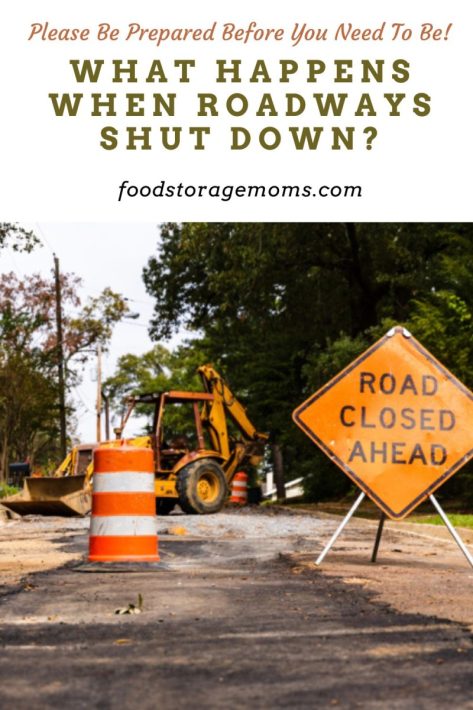
Reduced Traffic and Improved Air Quality
One of the most obvious consequences of the world shutting down is the reduction in traffic. When people stay home and businesses close, roadways that were once bustling with cars, buses, and trucks become eerily quiet. Of course, when there is less traffic, there is an improved air quality as well! Airlines: 13 Things You Need To Understand
When people started having to perform their work remotely over the past few years, it’s surprising how much easier morning and afternoon commutes became. Traffic congestion hasn’t been as much of an issue, but now that things are getting back to “normal” conditions, we’re seeing transportation challenges return.
Decrease in Accidents
The decrease in traffic will also have a positive impact on roadway safety. It makes sense that if there is less traffic, then there will be fewer accidents! What To Do If There’s No Gas in a Hurricane
There are various times of the year when traffic increases, like in the summer vacation periods and over holidays as people travel to visit family. We should take these circumstances into account as we plan trips with our own vehicles.
If the roads are shut down due to flooding, landslides, stormy weather, or other emergency situations, you need to stay tuned to your TV, radio, or even social media news outlets so you can receive notifications from local authorities.
Road Closures
Damaged roadways often result in immediate closures for safety reasons. This can disrupt transportation networks and hinder emergency response efforts. How To Prepare For A Road Trip In many locations, lane closures are planned during the warmer summer months in colder climate zones so the weather isn’t as much of a factor. We all need to be aware of reduced roadway capacity in work zones during those times of year until the necessary work is completed.
You can expect a diversion in your routes as traffic planners outline detours that may be necessary. Be particularly aware of lane changes near intersections, a freeway exit, an overpass span, and other areas where traffic is affected when lanes are closed or space for vehicles is limited.
Plan ahead and find out what the project duration plan is so you can organize your routes accordingly. Don’t find yourself surprised by the situation if you had an opportunity to do some research and structure your route for effective travel.
Communication Disruption
Roadway damage may also disrupt communication infrastructure such as fiber optic cables, power lines, cell towers, or telephone lines that are located near, alongside, or underneath roads. This can impact phone and internet connectivity in affected areas.
I suggest you carry a hand crank radio in your vehicle as a backup communication device, just in case. You always want to have access to the latest news, no matter where you are.
Disrupted Supply Chains
Ruined roadways can interrupt supply chains by making it difficult for a local carrier to move freight as they transport goods and supplies. This may lead to shortages of essential items and delay aid distribution to affected communities. Surviving the Apocalypse with Poor Eyesight This kind of transportation emergency is one we often don’t think about.
If you want to see how critical the trucking industry is to our economy, take a position near a freeway that is the main trucking route in your state. You’ll be surprised at the high percentage of traffic on that road from the trucking segment.
Increased Travel Time
With damaged roads, alternative routes need to be established, leading to longer travel times and congestion on detour routes. This can impact commuting, emergency services, and the movement of goods. 35 Items Every Prepper Should Have When Traveling
Economic Impact
A Natural Disaster can impact you on roadways and can have significant economic consequences. Businesses may suffer due to limited access, reduced tourism, and decreased transportation efficiency. 15 Valuable Skills I Learned In Home Economics
Repair and Reconstruction
After a natural disaster, roadways must be inspected, repaired, and reconstructed. This process requires time, resources, and coordination among government agencies, contractors, and engineers. How to Choose the Right Backpack for Emergency Situations
Why are roadways important?
- Transportation – Roadways serve as the primary mode of transportation for people and goods, allowing for easy movement between cities, towns, and rural areas.
- Economic Development – Efficient road networks contribute to economic growth by facilitating the movement of goods and services.
- Accessibility – Roadways ensure accessibility to remote areas, enabling communities to access education, healthcare, employment opportunities, and recreational activities for all riders using the roads.
- Emergency Services – During emergencies or natural disasters, roadways are vital for the movement of emergency responders and all the equipment needed to effectively address the situation. Emergency Cones
- Tourism and Travel – Well-maintained roadways promote tourism and travel by providing easy access to popular destinations, attractions, and scenic routes.
- Infrastructure Development – Road construction projects create jobs and stimulate economic activity.
- Public Safety – Properly maintained roadways help safety by implementing traffic regulations, signage, and infrastructure such as traffic lights, crosswalks, and speed limits for the protection of drivers, passengers, pedestrians, and those riding a bike.
- Public Transport – Roadways accommodate public transportation systems such as buses, taxis, shuttle buses, and trains, providing affordable transportation options for those without private vehicles.
How to Help Take Care of Roadways in an Emergency
What happens when the roadways shut down? You can actually help take care of the roadways in an emergency. There are some simple things you can do to help keep the roadways clear and safe:
- Stay calm and assess the situation.
- Move your vehicle to a safe location if possible. Make room for emergency vehicles.
- Turn on hazard lights to alert other drivers.
- Contact emergency services if needed (dial 911).
- Set up warning signs or flares to warn oncoming traffic.
- Stay inside your vehicle unless it is unsafe to do so.
- Follow instructions given by emergency responders and provide additional space for them.
- Provide clear and accurate information about the incident when asked by local authorities.
- Cooperate with other drivers and emergency personnel on the scene.
- If able, assist injured individuals without putting yourself at risk.
- Document the incident through photos or written notes for insurance and law enforcement purposes.
- Report any hazardous road conditions to the appropriate authorities.
What is the best way for me to get current road conditions in my area?
There are actually a number of ways to determine road conditions so you can plan your route:
- The U.S. Department of Transportation’s Federal Highway Administration operates a national resource. You dial 511 and get up-to-date information you’ll find helpful.
- Check with your own local departments of transportation. Most states offer an app to check on road conditions.
- Most local area news outlets also have apps you can download that post ongoing updates for weather and general road conditions.
- There are navigation apps like Google Maps, Waze, and Apple Maps that provide turn-by-turn real-time traffic and road condition information.
More Tips
- What To Do With Boxes of Unused Cereal
- What To Do With Old Sandbags
- What Happens When The Power Goes Out
- How To Make Your Own Emergency Car Kit
Final Word
I’ve always wondered what happens when roadways shut down. Well, a lot happens, you just have to take it one scenario at a time. I hope that you never have to worry about this in a situation, but with hurricanes, earthquakes, and wildfires, you just never know. As with other emergency situations, a transportation emergency can affect your life and put you at risk. Do all you can to properly prepare and plan ahead. May God Bless this World, Linda
Copyright Images: Roads Closed Sign Depositphotos_265612200_S by Wasppics, Roads Closed Depositphotos_471552626_S by C5Media

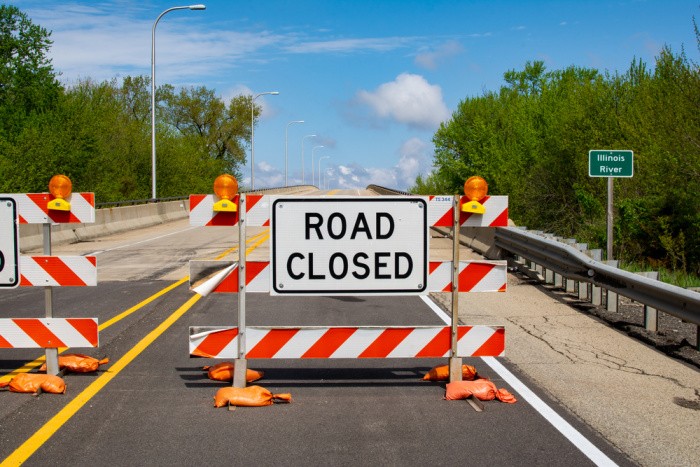


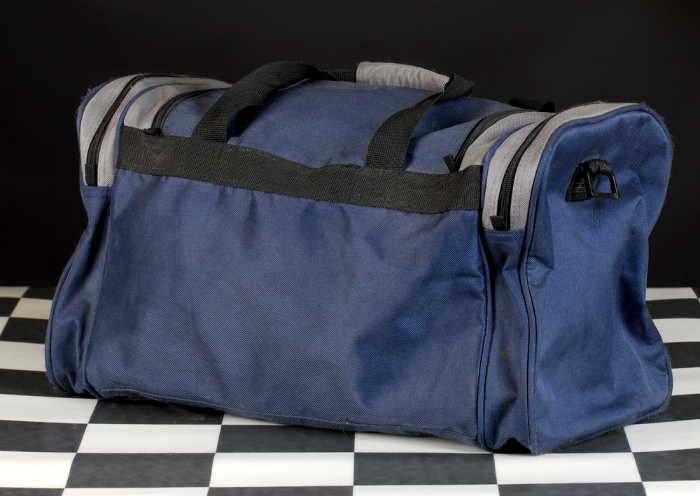
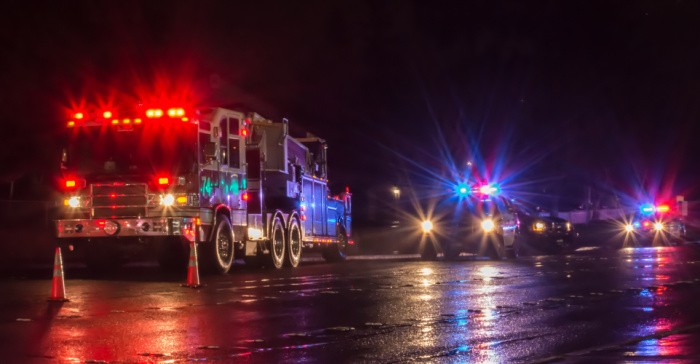
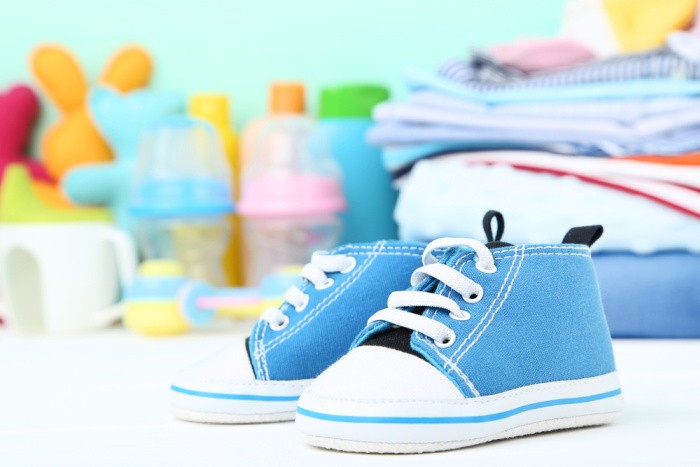
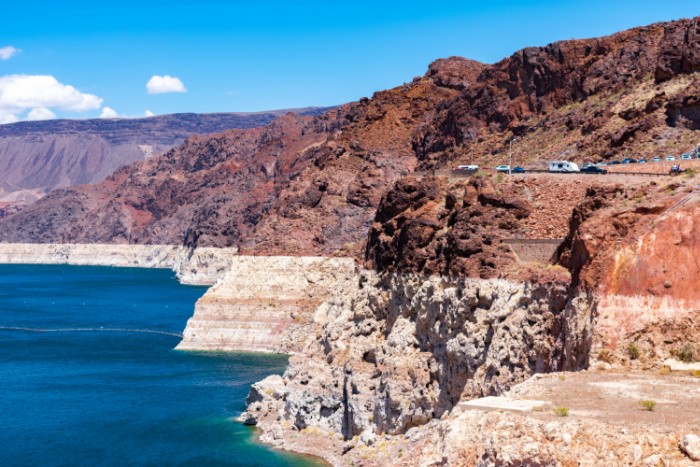
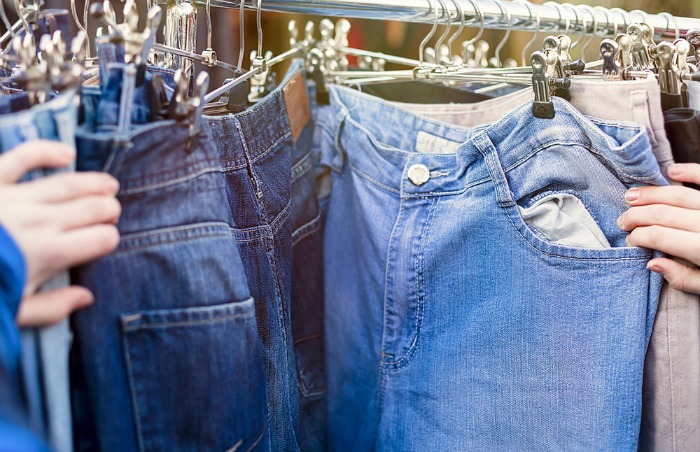













Once when heading to military training I followed a blizzard. The roadside stores were running outta everything from food to fuel. I made 8 miles one day. That was all I could go.
I got to a pass by the blue mountains in Tennessee crossing over and a highway patrolman waved me over. I was in a 4×4, had chains and extra fuel and a case of MREs which he questioned me about. He stated I’m going to close the road behind you will you pick up anyone stranded? I replied I would and he asked if I’d do both sides of the road which I replied I would. He said another trooper will wait for you on the other side. It was uneventful but eerie.
We prepare not for Hollywood but for reality and eventuality.
Things happen don’t get caught short
Matt –
I have been in a situation where I was the last vehicle crossing a pass before it was closed! Truly is eerie. Now I live in Wyoming and it is weird to see the signs on the freeway: Road closed 1/2 mile ahead if lights flashing AND railroad type arms that come down to close the highway. Apparently, roads close frequently here due to blizzard conditions. This I am not used to!! So, I have a bin that I will be carrying in my car before I start seeing the first snowflake!
I’m actually up here visiting, leaving Dubois and heading to Cheyenne in just a few, and seen them signs and barriers. Wife and I discussed them think it was in South Dakota or Montana maybe.
It’s a long ways to something so I think folks should heed them signs and barriers and have plenty of stuff in their truck to spend a cold night or three.
Have a safe trip. I agree, we need to think ahead about having our vehicles ready and stocked. But, not only during the winter months but also during the rest of the year. Just like our go bags need to be changed out for different seasons, so do our vehicles.
My daughter told me just the other day that then were told when moving to their place in WY that they need to know the back roads so if the freeway is closed, they would have a chance of getting home. They have mapped out 3 ways to get from town to their home on dirt roads. I did caution them, however, that getting stuck on a backroad somewhere they aren’t familiar with could be more dangerous than sticking with the major roads (i.e. freeway). It does seem though that the closures happen very close to towns so it is likely there would be places to stay – restaurants, motels, etc.
HI Leanne, I remember one winter well actually it was in April and the snow just kept coming down. My kids were coming to Southern Utah and there is one or two very scary sections like Nephi, Beaver, and Cedar City, Utah. The snow is really bad there. My son in law who was driving called and said we need to stay in Cedar City, Utah, we can’t see the front of our 4 x 4 truck. Luckily the family made it to motel. They have closed the roads near those areas. Linda
Hi Matt, yeah, I had no idea they had that much snow! Linda
Hi Leanne, wow, they must have a lot of snow in Wyoming! In Utah there are canyons you better know not to travel on if it snows. They have way too many spin outs. Hopefully, you won’t have to go out in the winter when its a blizzard!! Linda
Hi Matt, oh my gosh, thank you for sharing this great story. 8 miles…….blizzards, white-outs, and blowing snow give me so much anxiety. We have always had a 4 X 4 car because we live in Utah. You can’t go up the canyons without a 4 x 4 ,snow tires or chains. I never did like to ski even though Utah has some of the best snow on earth. But that’s way different than heading to military training following a blizzard, white knuckles for me. Luckily the Highway patrolman recognized you could help and that you got through before they closed the road. You were a blessing to that area for sure. Great story. Linda
This made me think of the year we were stranded at home due to flooding on one road and a huge break in the other that goes to town. The break was about a 4 foot gap in the road where it washed away. It’s kind of like a dam in that area. Luckily we didn’t need to go to the store for anything. It was a strange feeling to know we couldn’t get to anywhere. But it made me more aware of what can happen.
It is a strange feeling! I was stranded back in January on a farm 25 miles from the nearest town. Sort of a long story but the blowing snow drifted in the driveway and road. I was caring for 4 of my grandkids and because I had fractured my shoulder, I couldn’t have gone anywhere anyway. But, it is disconcerting when you are “stuck” and cannot go anywhere! We were fortunate in that the freezer was full, the fridge was packed and the cupboards were stocked. We didn’t lose power either. So, we were in very good shape when it came to being able to stay at home.
Hi Leanne, yikes, I remember you stayed to help with your grandkids! I also remember the fractured shoulder!! What an ordeal you went through!! Linda
I think of this with Hurricane Ian. No one could get through AND you have to show an ID to even prove you live there. Crazy!
HI Jess, oh wow, the ID, thanks for sharing that tip! It makes sense! Linda
Well, in January, there wasn’t a lot of snow on the ground. Not like I grew up with! Where I grew up, we could have 2 feet fall but no wind so it just piled up. I remember fence posts with 1-2 feet of snow standing straight up! Here in Wyoming, the wind blows so 1 foot of snow blows around leaving bare ground but 10-15 foot deep snow drifts. I actually watched a drift bury fence posts in minutes. Pretty awesome and frightening. Awesome if you don’t need or can’t go anywhere. Frightening if you do!
HI Leanne, yikes, that is frightening if you need to go out. We would be fine with food and water but a hospital emergency we would have to venture out! Stay safe, Linda
I have been a situation years ago where there was so much snow that I couldn’t see most of the freeway. It hit in Ely, NV and it was night. I had our 4 little kids and my husband asleep in our orange car. My husband told me not to stop but just say on the road no matter what lane I was in. I looked back and saw that I had a line of cars following me because they could see me and our orange car. We drove like that for many hours until the snow stopped. Wow, what a night!! We made it home safely and had a wonderful Christmas, very thankful for our safety.
Hi Cheryl, oh, that would be so scary. Follow the orange car….this very thing happened to Mark and I when we were moving to Logan, Utah. At night. We couldn’t see the front of the blue station wagon (you’re probably to young to remember those babies, LOL). No 4 x 4 and we were going up Sardine Canyon. It was the worst snowstorm of the year (that year)! Mark was driving a U-Haul and I had the kids in the back of the station wagon, no car seats back then. We made it safely as you did. Boy, the memories we all have. Very thankful, indeed. Linda
We had somewhat the same happen in a bad dust storm that I mentioned above. We came the the same area and encountered a horrible dust storm. We were caring 2 couches in a trailer , I was driving my ’64 Chevy. The visability was very bad. Were were in it a long time and by the time we got out of it we found it had sandblasted almost all the paint on the front of my car. We had to spray everything to blow all the dust out of the car, us and the couches We still have the couches and I sold my car years later. Yes, what we did when we were young with our kids is amazing!!
Hi Cheryl, oh those dust storms pit the paint, dang!! It truly is like sandblasting! Luckily you made it through without any crashes. Plus, the couches were saved! Oh, the memories we have, love this story, glad you were okay! Linda
When I was a child, we lived in a small town just south of Richmond Virginia. One year a hurricane followed the James River up past Richmond. All the bridges from the Chesapeake Bay to outside of Richmond were destroyed. To cross the James River you had to go downriver to where they had a ferry system in Surry, about 50 or so miles away. As quickly as they could, they reopened the Ferry in Hopewell, about 20 miles away. The other option was to go upriver to near Charlottesville, about 60 miles away. Luckily there were grocery stores, gas stations and medical care on the both sides of the river. The problem was the people who lived south of the river and worked north of the river (and vice versa.) On a personal level it was good this happen before my dad changed jobs and was working downtown… on the other side of the river. The bad new is that a week after this happened my brother was scheduled to see the orthopedic and have the cast removed from his arm. My mother got him to wait a week after he was supposed to have the cast off, then he took the cast off himself. His arm wasn’t healed and the break shifted and he had to have it rebroken and set so it would heal correctly. The bridges were rebuilt, higher and strong enough to survive a hurricane. Today there are a lot more bridges than back in the 1960’s.
Another time when a roadway might have been closed and I am surprised that it wasn’t was when I was working in Pennsylvania and was returning to work at a job where I lived in except for my days off. We had an inch or two of a light snow that morning and then the wind start to blow long and hard. The snow was blown in drifts and there was a drift over the road. For about 1/3 mile, the road was cut through a drift about 10 feet tall and was only one way. It was a bit eerie to drive through the still blowing snow with wall taller than the semi I was following on both sides. Then you came out to an area with just a dusting of snow.
Hi Topaz, oh my gosh, that was a bad situation! Then your brother took his cast off, yikes! I bet that didn;t feel good to have it rebroken, and reset. That was a big learning curve for him! I can’t imagine following a semi and praying you. made it to the end with 10 foot snow drifts! OH MY GOSH! I’m glad you made it through okay. Great stories, thank your for sharing. Linda
It was bought home to me just how much we needed an alternate method of getting about when there was a car accident on the main route past my town. It was quite serious the air ambulance was bought in and one side of the road was completely closed off. Turns out that of the 6 routes out of town, 5 of them feed onto that main road and the 1 that doesn’t is on the far end of town to me, the town was gridlocked for hours as all the traffic heading south had to be diverted which then caused blocks for north bound traffic and anyone trying to get out of town, all the smaller roads were also gridlocked as heavy traffic had diverted down them. It was crazy and eye opening, this was a one car accident and our town shut down for nearly 8 hours. I now have maps of walking routes, bike routes out of town etc, I made sure we all had a bike that was in working condition, thankfully not had to use them for that but they’re ready
Hi Hayley, oh my one gosh, one car accident and 8 hours of cars lined up not able to move. I love you idea of the maps. I have them for evacuation plans but we need them for an emergency such as this. Great idea for the bikes! Thank you for sharing, Linda
during and after hurricane katrina in our area we had no water for a week and no electricity for a month.
the sky was dark and there was no noise at night. my wife and i camped in the house, we thought it was great. better than sleeping on the ground like we did in our youth.
Hi CID, Hurricane Katrina….that was a bad one. No water for a week and no electricity for a month! What a great attitude. Our friends son was going to Tulane and luckily were able to evacuate. They had to leave their home. I’m glad you survived the ordeal. Thank you for sharing, Linda